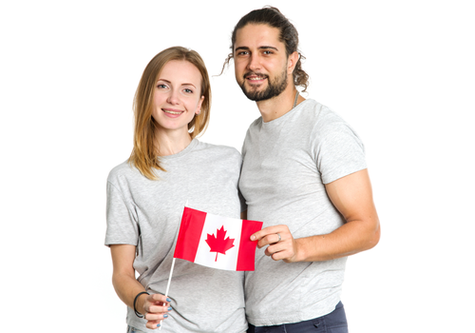Canada is an attractive destination for immigrants for various reasons, including its welcoming environment for newcomers, diverse opportunities for skilled workers, and high quality of life for all its residents. Additionally, the nation prioritizes social welfare with comprehensive healthcare and education systems that enhance the overall well-being of residents. The country makes it a sought-after location for those looking to build a better future for themselves and their families.
Sponsoring a spouse or partner for immigration to Canada is a crucial way to reunite families and allow loved ones to start a new life together. The Canadian spousal sponsorship program enables Canadian citizens and permanent residents to bring their spouses, common-law partners, or conjugal partners to Canada as permanent residents.
There are two main pathways for this process: Inland sponsorship for couples living together in Canada and Outland sponsorship for couples with one partner outside Canada. Each pathway has specific requirements, but both aim to ensure that relationships are genuine and that families can be together in Canada.
Who is eligible to sponsor a Spouse or Partner for Immigration to Canada?
Let’s check who is eligible to sponsor a spouse or partner for immigration to Canada.
Eligibility Requirements for Sponsors
- Age: Sponsor must be at least 18 years old.
- Status: Sponsor must be either a Canadian citizen or a permanent resident of Canada.
- Legal Standing: The sponsor must not be:
- In prison
- Bankrupt
- Under a removal order
- Charged with a serious offence.
- Previous Sponsorship: The sponsor should have sponsored only one spouse or partner within the last five years.
- Sign a Financial Undertaking: Sponsor must sign a Financial Undertaking. This legally binds them to support their foreign national spouse or common-law partner for up to three years, even if the relationship ends.
What Basic needs must Sponsors provide for their Spouse or partner in Canada?
Basic needs for sponsored individuals refer to the essential requirements the sponsor must fulfil. As per IRCC, the basic needs include the following:
Everyday Essentials
- Food: Provide adequate nutrition and meals.
- Clothing: Ensure access to appropriate clothing for different seasons and occasions.
- Shelter: Secure a safe and stable living environment.
- Other Needs: Cover additional necessities for daily living, such as hygiene products and household supplies.
Health Care Needs
- Dental Care: Provide access to dental services and treatments not covered by public health insurance.
- Eye Care: Ensure access to vision care, including eye exams, glasses, or contact lenses.
- Other Health Needs: Cover any other medical expenses not included in the public health services provided by the province or territory.
What relationship types qualify for spousal sponsorship in Canada?
The nature of the relationship between the sponsor and the sponsored individual determines eligibility for the pathways to spousal sponsorship in Canada.
The following categories define the types of relationships that qualify:
Types of Relationships
- Spouse: The individuals must be legally married. A marriage certificate from the relevant province or territory is sufficient if the marriage occurred in Canada. If it took place outside Canada, it must be valid under that country’s laws and Canadian federal law.
- Common-law Partner: This applies to couples who have lived together in a marriage-like relationship for at least 12 consecutive months. Continuous cohabitation is essential, with any time apart being short and temporary.
- Conjugal Partner: A conjugal partner is someone with whom the sponsor has maintained a committed relationship for more than 12 months, but significant obstacles have prevented them from living together. These obstacles may include immigration barriers or cultural/religious beliefs.
Read to Know: Bringing Family to Canada: Who Can I Sponsor?
What are the processing times for Spousal sponsorship?
IRCC has set a service standard of 12 months for processing spousal sponsorship applications, whether applicants submit them through Inland or Outland pathways. However, actual processing times can vary based on factors such as the type of application, the visa office handling it, and individual circumstances. Some may take up to 6 months, and some may take a little longer to 24 months, depending upon the specific case.
The processing time for
- Inland Sponsorship: Approximately 10 months.
- Outland Sponsorship: Around 13 months for applications submitted from outside Canada.
Inland Sponsorship: Key Facts for Spouses and Partners
An immigration process that allows Canadian citizens and permanent residents to sponsor their spouses or common-law partners for permanent residence while they are living together in Canada is Inland sponsorship. Here are the key facts to note if you are the sponsor:
- Valid Temporary Resident Status: The foreign national must have valid temporary resident status in Canada, either as a visitor or with a work or study permit.
- Spousal Open Work Permit (SOWP): If already living in Canada, the sponsored partner may apply for a Spousal Open Work Permit simultaneously with their PR application.
- Co-habitation Requirement: Spouses and common-law partners must live together at the time of application submission. Couples in conjugal relationships are not eligible for inland sponsorship.
- Travel Recommendations: IRCC advises that applicants must stay in Canada while their application is being processed. Leaving Canada may hinder reentry, particularly if a visitor visa is required.
You may gather relevant supporting documents that demonstrate the genuineness of the relationship and the eligibility of both parties. For an effective application submission and hassle-free process, you may contact our team.
Outland Sponsorship: Things You Must Know as a Sponsor
Outland sponsorship allows Canadian citizens and permanent residents to sponsor their spouse, common-law partner, or conjugal partner for Canadian PR. It is suitable for couples where the sponsored individual is not residing in Canada at the time of application.
In order to sponsor the partner, the relationship must be one of the following:
- Spouse: Legally married with a valid marriage recognized in Canada.
- Common-law partner: Cohabiting for at least 12 continuous months.
- Conjugal partner: In a committed relationship for at least 12 months, unable to live together due to significant barriers.
Things to Remember:
- Travel Flexibility: Sponsored individuals can travel in and out of Canada while their application is being processed, making this option suitable for those needing to maintain travel.
- Financial Responsibilities: Sponsors must commit to financially supporting their spouse or partner for up to three years, ensuring they do not require social assistance.
- Dependent Children: Dependent children of the sponsored individual may also be included in the application and can receive an open work permit if eligible.
If an outland sponsorship application is denied, the applicant can appeal the decision within 30 days or choose to reapply. Common reasons for denial include failure to meet eligibility requirements or concerns about the relationship’s authenticity. Seeking legal assistance is advisable to navigate the appeal or reapplication process effectively.
You may contact ImmiLaw Immigration for a detailed consultation regarding sponsoring your spouse or partner for permanent residency in Canada. Our services include comprehensive application preparation and document review. We also provide personalized support to navigate the complexities of immigration regulations effectively. We ensure you receive expert guidance throughout the application process.
Feel free to contact us for a detailed and hassle-free consultation.
Read to Know: Is Criminal Inadmissibility Blocking Your Path to Canada? Here’s What to Do!


